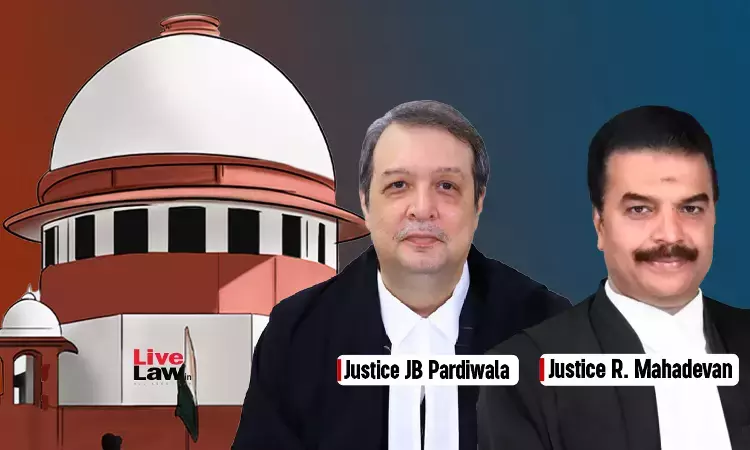- Home
- /
- Supreme court
- /
- Failure To Serve S.80 CPC Notice...
Failure To Serve S.80 CPC Notice Nullifies Decree ; Executing Court Bound To Consider Plea Of Nullity : Supreme Court
Yash Mittal
9 Aug 2025 9:42 AM IST
The Supreme Court recently observed that the plea regarding the decree being 'nullity' can be raised at the executing stage, and the Executing Court is bound to decide the same on merits. “As per Section 47, the Executing Court is empowered to examine the questions relating to execution, discharge, or satisfaction of the decree. It cannot go beyond the decree; but at the same time, when a...
The Supreme Court recently observed that the plea regarding the decree being 'nullity' can be raised at the executing stage, and the Executing Court is bound to decide the same on merits.
“As per Section 47, the Executing Court is empowered to examine the questions relating to execution, discharge, or satisfaction of the decree. It cannot go beyond the decree; but at the same time, when a plea is raised that the decree is a nullity and hence, unenforceable, the executing court is bound to examine and decide such an application on its merits.”, the court observed.
“A decree may, however, be challenged in execution proceedings, if it is a nullity – for instance, if it is passed without bringing on record the legal representative of a person who was dead at the time the decree was passed, or where the cause of action was not maintainable, or if it was passed against a ruling prince without a certificate. An objection in that behalf may be raised in the execution proceedings.”, the court added.
The bench of Justices JB Pardiwala and R Mahadevan heard a case in which a decree for money recovery was passed against the appellant, a state-owned entity that was not originally a party to the proceedings. On an application by Respondent No. 1, the appellant was added as a party without being served the mandatory notice under Section 80 CPC before instituting the civil suit. The trial court decreed the suit in the respondent's favour, and the executing court rejected the appellant's objections under Section 47 CPC. The High Court also denied relief, leading the appellant to approach the Supreme Court.
Setting aside the impugned findings, the judgment authored by Justice Mahadevan observed that the serving of notice under Section 80 CPC being a mandatory requirement before institution of suit against the state-owned entity, the failure to provide the same rendered the decree being a 'nullity', being amenable to challenge before the Executing Court during executing proceedings under Section 47 CPC.
“A plain reading of Section 80 along with the settled position of law clearly enunciates that it is a duty of the trial court to deal with that aspect of satisfaction of the notice under Section 80. Such preconditions to be satisfied before initiation of a suit are recognized as mandatory in civil disputes where a statute prescribes the same…The trial Court, in the present case, failed to do so, thereby rendering the decree a nullity.”, the court said.
It was held that the failure to serve S.80 notice "has gone into the root of the jurisdiction of the trial court to entertain the suit against the appellant/4th defendant."
Reference was drawn from the case of Brakewel Automotive Components (India) (P) Ltd. v. P.R. Selvam Alagappan (2017), where the Court held that the power of the Executing Court under Section 47 CPC lies in the narrow compass as the Court cannot go beyond the decree, but can decide the plea regarding its nullity if the decree was passed in ignorance of provision of law or else becomes inexecutable due to change in law.
“From the above pronouncements of this Court, it is amply clear that at the stage of execution proceedings, objections regarding the maintainability of the suit as well as the jurisdiction of the trial Court can be raised for consideration, and the executing court is well within its powers to deal with such objections in accordance with law, if such objections, from the face of the records, do not require adjudication by trial. However, in the case on hand, the objections raised by the appellant regarding the maintainability and the execution proceedings have been rejected by the Executing Court at the threshold, without going into the contentions.”, the court said.
Resultantly, the appeal was allowed, and the decree passed against the Appellant for money recovery was declared a nullity.
Cause Title: ODISHA STATE FINANCIAL CORPORATION VERSUS VIGYAN CHEMICAL INDUSTRIES AND OTHERS
Citation : 2025 LiveLaw (SC) 772
Click here to read/download the judgment
Also From Judgment : Public Institutions Must Handle Cases Diligently; State Must Have Internal Mechanisms To Monitor Pending Litigations : Supreme Court



